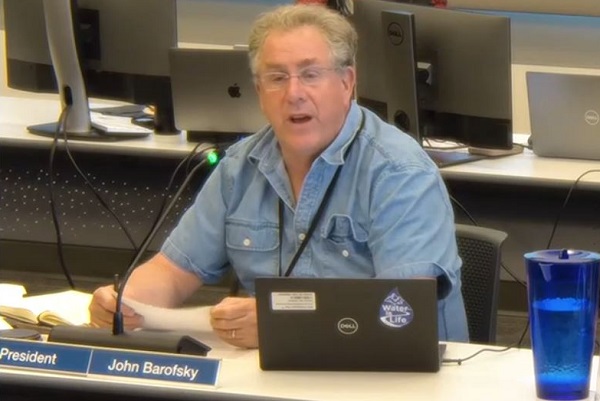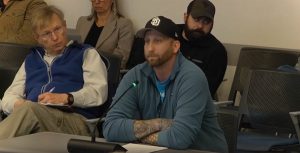EWEB commissioner: Public would be outraged to learn Eugene is not maintaining aging fire hydrants
5 min read
UPDATE (Aug. 22, 2025): At least 14% and perhaps as many as 25% of Eugene-owned fire hydrants are older than the average service life, according to statistics provided in response to a public records request. The new inventory by age reports 76 more hydrants than the 500 cited in the August 5, 2025 EWEB board meeting packet. The inventory of 4,034 city-owned hydrants was retrieved from the ELOG system Aug. 11, 2025.
Presenter: The city of Eugene has fallen behind in replacing its aging fire hydrants. About 11%—500 of the area’s 4,500 hydrants—are operating past their average service life of 60 years. Some are low-flow hydrants that are nearly 100 years old. Should EWEB take on responsibility for the city’s fire hydrants? At the Aug. 5 board meeting, Commissioner John Brown:
John Brown (EWEB, commissioner): I’m all in favor of bringing this in-house, but I’m not in favor of us taking on the total financial responsibility. I believe they have the money, they just don’t have the priority.
[00:00:35] I talked to firefighters, a city councilor, and other people, and this is not a line item budget in the fire department. They just do it.
[00:00:41] And in fact, I think there would be a public outrage if the public knew that they were not maintaining it. There’s so many low-flow 100-year-old fire hydrants that it’s scary, especially in the South Hills, to know that if we have a wildfire, there’s going to be a lot of—I mean, didn’t College Hill almost run out of water when Civic Stadium burned? I mean, it came close to running out of water, just for that one fire. Think if we had a wildfire.
[00:01:05] Presenter: Commissioner John Barofsky thought EWEB should take on the hydrants whether the city can help pay for them or not.
[00:01:12] John Barofsky (EWEB, commissioner): If the city of Eugene had money to replace fire hydrants, they’d be replacing more than 27 a year, okay? That’s one of the reasons why they’re only doing 27 a year, because they’re financially constrained…
[00:01:24] I talked to a firefighter yesterday about this. And he says, there’s one guy out there with a truck replacing these things, you know? So we have the ability to do this more efficiently, better, and protect our water system. And if that costs us, my customers, a dollar a month, to me, it’s worth it.
[00:01:45] Presenter: Commissioner Tim Morris:
[00:01:47] Tim Morris (EWEB, commissioner): I was a little shocked to see the city of Eugene’s replacement rates and I think that that’s a acknowledgment in its own that this is a good conversation to have and a good project to move forward with. So I want to flag my support on this and just say thank you.
[00:02:03] Presenter: EWEB General Manager Frank Lawson:
[00:02:05] Frank Lawson (EWEB, general manager): There are some benefits to EWEB. I would characterize those as sort of efficiencies, protection of the water system. There’s a number of different things. It is connected to the drinking water system, these particular appliances. We also receive a number of complaints every year about cloudy water, things related to the testing of fire hydrants, for example. It’s not the full list of customer complaints, but it is a portion.
[00:02:37] There’s also some community value in the improved maintenance, public safety, water quality, targeted service levels for how the emergency water—in this case for firefighting, fire suppression—would be available if used and how those assets would be managed.
[00:03:01] We also, as part of the background material, identified a number of potential risks. Some of those compliance-related, some of these have to do with how we would negotiate potential transfer with the city of Eugene, how that is structured, what kind of discretionary immunity, for example, might apply, what kind of indemnity we would ask for from the city relative to their implementation of standards and codes throughout our service territory.
[00:03:36] All those things matter and are things that we would include as part of our negotiation.
[00:03:45] If the city was not to contribute financially to a transfer, there’s some other things we could potentially negotiate with the city… But on the outside, $850,000 a year on the water side represents about a 2% revenue requirement or rate increase, if you wanted to call it an average rate increase.
[00:04:07] And that’s based on what we felt was a targeted, a good level of replacement rate of roughly 60 per year, 60 hydrants per year to maintain the appropriate age and reduce the age of the assets that were the oldest.
[00:04:25] Presenter: Commissioner John Brown:
[00:04:27] John Brown: Once we take this on, it’s forever. We can never cut it from the budget. ‘Cause right now we’re delaying projects and everything. We’re not going to delay fire hydrant replacement. That’s a PR issue. Like I say, if this was public, if more people knew about it, I think it would be in the front page of the paper.
[00:04:42] And the cost isn’t going to stay at $850 (thousand) a year. So I’m all for it, figure it out financially, but I don’t want to just turn around and take on 100% of the financial cost.
[00:04:53] Presenter: General Manager Frank Lawson:
[00:04:55] Frank Lawson: It sounds like what I’m hearing is that conceptually there’s confidence in the organization to manage these assets and manage them effectively, but the details matter and that those details are ones that we’ll want to spell out some of the areas in the resolution and then others we could potentially even talk about through negotiations.
[00:05:20] Presenter: Commissioner Barofsky:
[00:05:22] John Barofsky: If and when this transfer goes through, I would welcome it to go on the front page of the paper that EWEB is taking over ownership of the fire hydrants and is making our community safer. That would be something that I would lean into.
[00:05:40] Presenter: The city of Eugene has been replacing about 27 aging fire hydrants a year but should be replacing 60, including century-old low-flow hydrants in the South Hills. Commissioners encouraged EWEB staff to continue discussions with the city that could lead to a transfer agreement.






